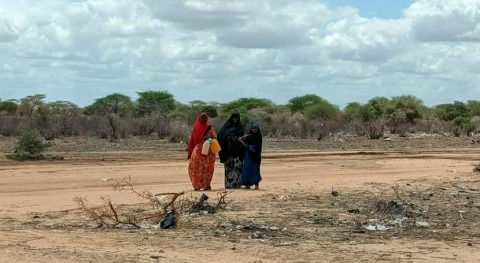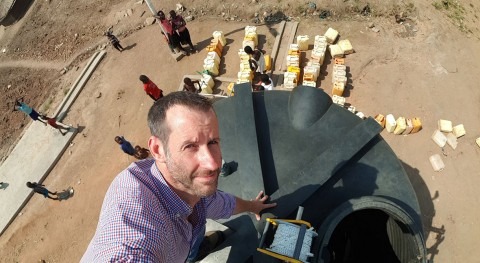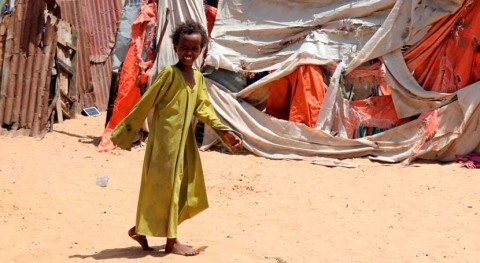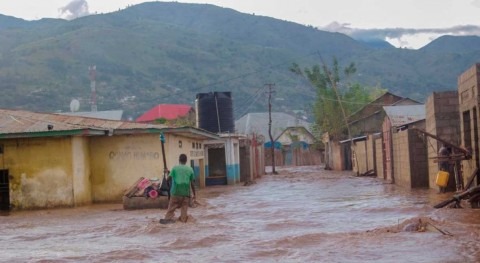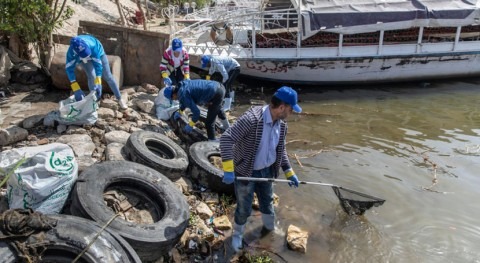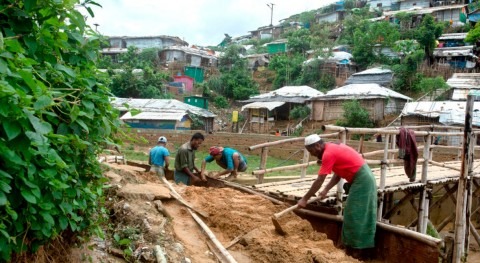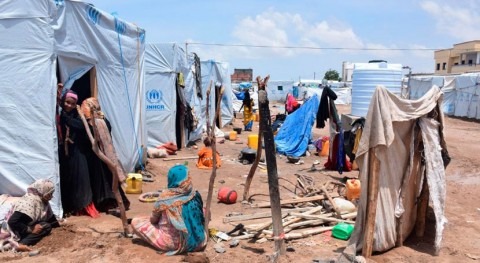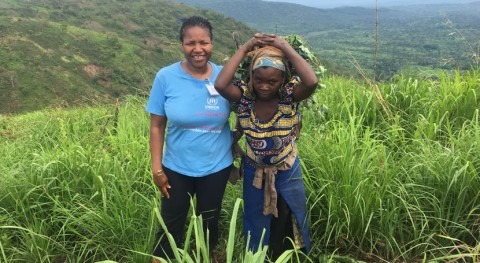When David Githiri arrived in Uganda in 2017 to oversee the technical team delivering services to refugees and host communities in the country for UNHCR, the UN Refugee Agency, his posting began amid a massive influx of people fleeing conflict in South Sudan.
One of the biggest challenges that Githiri – a civil and environmental engineer from Kenya – and his team faced was how to ensure the supply of enough water to meet the daily needs of the refugees, most of whom were women and children.
At the height of the emergency, with over half a million refugees arriving to the northwest region of the country, the only way UNHCR could deliver water to refugees in these remote and underdeveloped locations was by using a fleet of 630 trucks to supply water at a prohibitive cost.
“Safe drinking water was needed to prevent death and disease but delivering water by truck is expensive and notoriously difficult to monitor,” Githiri said. “We had to account for every dollar that was spent, but this presented major challenges.”
The country operations’ office, hundreds of kilometres away in the capital Kampala, would receive a continuous stream of hand-written paper receipts that were virtually impossible to verify.
“We needed a solution that was reliable”
To try to address these concerns, at its headquarters in Geneva another group of UNHCR engineers with experience working on water, sanitation and hygiene (WASH) operations in many refugee settings around the world set out to find an innovative way of monitoring water truck deliveries.
“We needed a solution that was reliable, inexpensive and could be applied in emergency settings in some of the most challenging operational environments in the world,” explained UNHCR WASH Consultant Ben Harvey.
The solution they came up with is now being used successfully in refugee and displacement camps in five difference countries, and on 24 September was announced by the European Commission as the winner of a prestigious 1-million-euro technology prize.
In creating the system, the team looked at a range of possible solutions before settling on technologies that had been used in the oil industry and setting out to apply them to the water sector.
The system uses a series of networked, ultra-sonic water-level sensors that are installed in the tanks of water delivery trucks as well as static water tanks in refugee settlements to provide real-time data on water deliveries and consumption. It is based on the “Internet of Things” – physical objects fitted with sensors in order to connect and exchange data over the Internet.
The devices, which cost around 50 euros each, send their readings to a central gateway similar to a mobile phone mast. The gateways have a range of 30 kilometres and can collate data from up to 20,000 individual sensors, meaning a single gateway can cover all the water tanks and trucks serving an entire refugee settlement.
The data is then fed to an online dashboard which gathers information from all the active gateways in a country or region, allowing Githiri and colleagues to see in real time how much water is being delivered and consumed across the entire country.
“The refugees are happier”
“It has improved service delivery and reduced shortages, because we are easily able to monitor deliveries and consumption and address potential shortages before they happen,” Githiri said. “The refugees are happier because they receive the services when they need them when it comes to water supplies.”
Providing refugees with a reliable and easily accessible supply of clean water is key to not only safeguarding health but also avoiding protection risks. Long distances to water points have been shown to put women and girls at risk of sexual violence and lead children to missing out on education opportunities.
During the pilot phase of the project, as well as Uganda the technology has already been installed in settlements in Iraq, Rwanda, Tanzania and Kenya, and is due to be rolled out in the world’s largest refugee camp in Bangladesh by the end of this year.
As well as monitoring water provision in camps, the system will also be installed in boreholes to monitor the impact of pumping on natural aquifers and therefore mitigate the negative environmental impact of extraction. Sensors will also be installed to measure water quality, flow rates and pressure in distribution networks. This will help UNHCR ensure equitable distribution of water within camps and ensure efficient operation of the systems.
“Innovation can help us deliver better and more effective aid”
The project was chosen as one of the five winners of the European Commission’s EIC Horizon Prize for Affordable High-Tech for Humanitarian Aid, claiming the prize in the water, sanitation and hygiene category.
Announcing the award, European Commissioner for Innovation, Research, Culture, Education and Youth Mariya Gabriel said: “These innovations clearly show how physical technologies such as sensors, solar panels or additive manufacturing can be combined with digital technologies to help those desperately in need, empower them, and improve resilience. I am very pleased to award this Prize both to well-established humanitarian organizations and to young, innovative companies that are dedicated to improving people’s lives.”
European Commissioner for Crisis Management Janez Lenarčič added: “Innovation can help us deliver better and more effective aid to people most in need. The technologies recognized today are a great testament to that. It is encouraging to see the great diversity of actors and new partnerships for innovation, from start-up companies to existing humanitarian organizations. I hope this award serves to support the scaling and broad adoption of these innovations in humanitarian work around the world.”
It is expected that among other initiatives, the 1-million-euro prize money will be used to expand the use of the technology to other parts of the world where UNHCR operates, and to fund projects to look at how similar systems can be applied to other aspects of humanitarian operations such as energy and environmental monitoring.
“We are all proud that the work we have done has been recognized in this way, and look forward to using the prize money to find new solutions to the problems facing refugees and improve their lives,” Harvey concluded.




